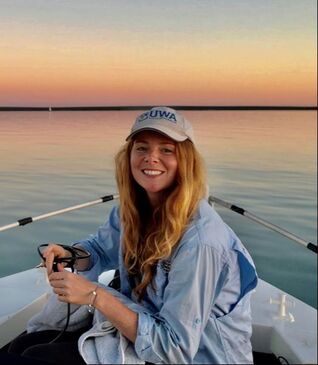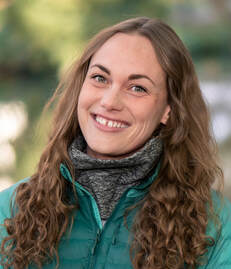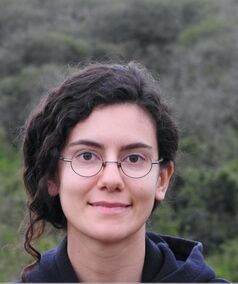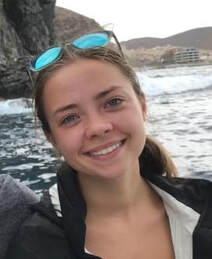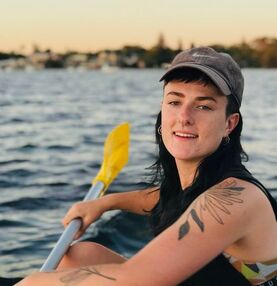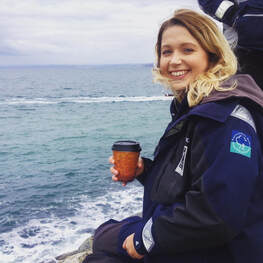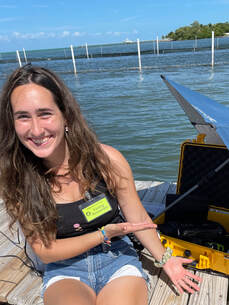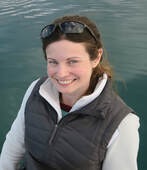Dr. Stephanie King
Associate Professor in Animal Behaviour, University of Bristol, UK
|
Stephanie is a behavioural biologist with a primary focus on animal communication systems and how these systems have evolved to help mediate complex social behaviours. To date, much of her research has focused on the temporal and social aspects of vocal interactions in bottlenose dolphins, and their use of individually distinctive signature whistles. She has over a decade's worth of experience studying marine mammal acoustic communication, as well as extensive experience in assessing the consequences of anthropogenic noise disturbance on marine mammal populations.
Stephanie's current research interests focus on understanding the interplay between vocal communication, social complexity and cooperative strategies. She continues to use bottlenose dolphins as a model system, with the aim of understanding how dynamic social environments may influence and shape the communicative strategies that animals employ when making decisions of when and with whom to cooperate. Stephanie is a PI of Shark Bay Dolphin Research alongside Prof Richard Connor, Prof Michael Krützen and Dr Simon Allen. Please visit www.sharkbaydolphins.org to find out more about the research currently underway in Shark Bay. |
Fellows and Postdocs
|
Dr Alice Bouchard
SNSF Postdoc Mobility Fellow Alice is particularly interested in the socio-cognitive abilities of mammals and the evolution of social intelligence. She completed her PhD at the University of Neuchâtel (Switzerland) on the social cognition of chimpanzees. Her postdoc research will be investigating the ability of bottlenose dolphins to acquire and store information about social partners and how they use this knowledge to assess their social relationships. Follow Alice on Twitter: @Alice_Bchrd |
|
|
Dr Danai Papageorgiou
Marie Curie Research Fellow Danai is a behavioural ecologist interested in how group living animals coordinate their lives together. She did her PhD at the Max Planck Institute of Animal Behaviour and the University of Konstanz on the social structure and collective decision making of wild vulturine guineafowl. She was then a fellow at the College for Life Sciences at the Wissenschaftskolleg zu Berlin working on how animal societies respond to the rise of inequality. Danai is now a Marie Curie Research Fellow researching how the ability of individual male bottlenose dolphins to synchronise during motor and acoustic displays is linked to their reproductive success and how epigenetics shape this link. Follow Danai on Twitter: @DanPapageorgiou |
PhD Candidates
|
Emma Chereskin
PhD Candidate, University of Bristol Emma completed her MSc at the University of Bristol in the Cetacean CommCog Group. For her PhD, Emma will use long-term social and life-history data spanning four decades and field-based manipulations using state-of-the-art technology (integrating drones and playback experiments) to determine the role that vocal signals play in coordinating polyadic cooperative acts among male dolphins. Follow Emma on Twitter: @EmmaChereskin Stephanie Mason
PhD Candidate, University of Western Australia Stephanie completed her BSc (Hons) at the University of Western Australia. For her PhD Stephanie is comparatively investigating the ontogeny of vocal complexity in the WA magpie (with Assoc. Prof. Amanda Ridley) and the Indo-Pacific bottlenose dolphin. With the Shark Bay dolphins, Stephanie will look at the development of social vocalisations in calves and juveniles and investigate how the social-vocal environment influences the formation of these unique signals. Follow Stephanie on Twitter: @StephLMason |
Laura Palmer
PhD Candidate, University of Bristol Laura completed her MSc at the University of St Andrews. For her PhD Laura is investigating the drivers of vocal complexity in bottlenose dolphins. Utilizing acoustic data from around the UK and Western Australia, Laura will determine how social structure, habitat configuration and anthropogenic noise influence dolphin whistle structure. Laura is also using signature whistles to track individual bottlenose dolphins in Cardigan Bay, Wales to inform their conservation and management. Laura is funded by a NERC GW4+ DTP studentship with support from the Ministry of Defence. Follow Laura on Twitter: @_laurapalmer93 |
MSc Students
|
Mackenzie Meier
M.Sc. Candidate, University of Bristol Mackenzie has a BSc in Zoology from the University of New Hampshire. For her master's thesis she will be investigating the information content in bottlenose dolphin whistles during a cooperative task. Follow Mackenzie on Twitter: @KenzieRyanM |
|
Group Alumni
|
|
